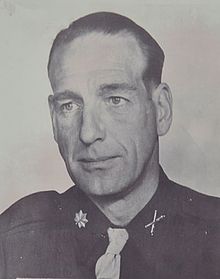Don Pratt
Don Forrester Pratt | |
|---|---|
 Pratt as a lieutenant colonel | |
| Born | July 12, 1892 Brookfield, Missouri |
| Died | June 6, 1944 (aged 51) Normandy, France |
| Buried | |
| Allegiance | |
| Service | |
| Years of service | 1917 – 1944 |
| Rank | |
| Unit | 15th Infantry Regiment |
| Battles / wars | World War II |
| Awards | Purple Heart |
Don Forrester Pratt (July 12, 1892 – June 6, 1944) was a United States Army general in World War II. He was assistant division commander of the 101st Airborne Division and was the highest-ranking Allied officer killed on D-Day of the Normandy Landings.
Biography
Early life
Born in Brookfield, Missouri, he received his military commission after enlisting for World War I, in August 1917, as a second lieutenant.[1]
From 1932 to 1936 he served as adjutant, 15th Infantry Regiment, in Tientsin, China. Next he was an instructor, for the infantry school at Fort Benning, Georgia, from 1937 until 1941. Upon the United States entry into World War II, he was named chief-of-staff, 43rd Infantry Division, 1941-1942. His next assignment, in August 1942, was as the deputy commander, for the newly formed 101st Airborne Division, at the rank of brigadier general. Pratt was named the assistant division commander on September 15, 1943, under Major General William C. Lee. Stationed near the town of Newbury, England, on February 9, 1944, Lee suffered a major heart attack. Pratt thought that he would be chosen to succeed Lee, but Maxwell D. Taylor, then 82nd Airborne artillery commander, was given command of the 101st Airborne.[1]
Invasion of Normandy
For the American airborne landings as part of the Invasion of Normandy, General Pratt, originally assigned to command the division train and reserve troops of the 101st to be landed by sea, received permission to land with a force of CG-4A Waco gliders assigned to Mission Chicago, the first U.S. glider assault during the invasion.[1][2]
Pratt flew as a passenger (along with his aide 1st Lieutenant Lee John May), in the lead glider, a quickly substituted CG-4A with a bolt-on Griswold nose protection device, painted to represent The Fighting Falcon.[2] The original "Fighting Falcon" was moved to position #45 in the flight serial. It was a CG-4A paid for by War Bond funds raised by Greenville, Michigan students who intended to raise the $17,000 cost of one glider, but ended up raising over $72,000.[2] Piloted by Lieutenant Colonel Mike Murphy, senior glider pilot of IX Troop Carrier Command (and Second Lieutenant John M. Butler), the #1 glider came down into its designated landing zone, LZ "E", two miles west of Sainte-Marie-du-Mont, Manche, Normandy, between 0345 and 0400 hours on June 6, 1944.[2]
The Waco glider landed successfully but when Lieutenant Colonel Murphy applied the brakes, the tall wet grass caused the glider to skid without significant slowing, and it overran the landing zone, crashing into a hedgerow line of 40-foot-tall (12 m) poplar trees. Lieutenant Colonel Murphy suffered severe injuries, with both legs broken, one a compound fracture. Pratt and Butler were killed. A tree limb came through the co-pilot side of the cockpit, killing Butler. Pratt, sitting in the Jeep, died from a broken neck resulting from whiplash. The Jeep was not chained, but was tied down with nylon rope and did not break loose. Lieutenant May was riding on the jump seat behind the Jeep and survived the crash.[2]
Pratt was first buried, wrapped in a parachute, in Normandy until the end of the war, then re-interred at Arlington National Cemetery (Section 11) July 26, 1948.[1]
Fictionalization
The incident was fictionalized as a scene in the film Saving Private Ryan, with Pratt becoming Brigadier General Amend.[3]
References
- Neillands, Robert, and Roderick de Normann, (2004). - D-Day 1944 - Voices from Normandy. - New York, New York: Cold Spring Press. - ISBN 1-59360-012-7
- Norberg, John, (2003). - Wings of Their Dreams: Purdue in Flight. - West Lafayette, Indiana: Purdue University Press. - pp. 159–160. - ISBN 1-55753-362-8
Footnotes
- ^ a b c d Don F. Pratt. - Arlington National Cemetery. - Retrieved: 2008-06-08
- ^ a b c d e Eckert, David. - Waco Drawings - Tribute to the American Combat Glider Pilots of World War II. - (c/o www.pointvista.com). - Retrieved: 2008-06-08
- ^ Saving Private Ryan: Brigadier General Amend. - Saving Private Ryan Online Encyclopedia. - Retrieved: 2008-06-08
